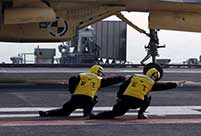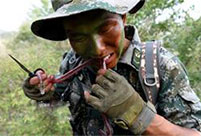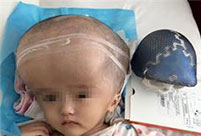

TOKYO, July 21 -- Japan's Mitsubishi Materials Corp. on Sunday in the United States offered what Japanese media described as an "historic" apology to U.S. prisoners of war (POW) who were used as forced labor during World War II in a copper mine in northern Japan.
The apology by the Japanese firm should also be delivered to close to 500 Chinese laborers who were also forced to work at the criminal site where the U.S. laborers were also imprisoned. Unfortunately, Mitsubishi Materials made a selective and hypocritical apology.
As the saying goes, "If a leader sets a bad example, it will be followed by his subordinates." Mitsubishi's remorse came after Prime Minister Shinzo Abe offered his "eternal condolence" and " deep repentance" to the U.S. souls lost in WWII, although both stopped short of directly offering a sincere apology to Asian countries, especially China and South Korea, which suffered the most from Japan's wartime atrocities.
It is lucky for 94-year-old James Murphy, one of the only two surviving forced laborers among some 900 American POWs who worked at the copper mine near Hanawa, since he has received the late apology alive.
But it is tragic for those Chinese and South Korean souls who have already passed, as well as the surviving victims, as such selective apology by the Japanese government and companies, brutalizes them all over again.
According to official Japanese data, a total of 3,765 Chinese nationals were forcibly taken or kidnapped to work at 12 sites belonging to Mitsubishi Materials during the war and 720 were tortured to death or died from extremely heavy labor. Eighty six Chinese forced laborers died in the same place where Murphy worked.
Since 1997, Chinese survivors of forced labor and their relatives filed lawsuits against the Japanese company in Tokyo, Hokkaido, Fukuoka, Nagasaki and Miyasaki, but all the cases were rejected by Japanese courts. The latest case was filed last February in Beijing but Mitsubishi Materials was reluctant to respond.
It is a question for the Japanese government and Mitsubishi Materials if there are any differences between Chinese and U.S. forced laborers regarding the issue of apology? If the answer is no, the government here and the company should swiftly offer the same apology to its Asian victims.
It is for Japan's interests to mend ties with its closest neighbors, not only on the forced labor issue, but also on other historical issues that prevent reconciliation. If Japan continues to thwart its moral obligations, it will never be accepted as a real "normal country" by its neighbor and the rest of the world.
Last but not least, to mark the 70th anniversary of the end of World War II, Japan should make a wise choice to bravely face up to its dark wartime past, offer a sincere apology to those who most want it instead of U.S. POWs only, and take concrete action to prove to the world that Japan will firmly follow a path of pacifism.
 Soldiers serving at Liaoning aircraft carrier
Soldiers serving at Liaoning aircraft carrier Bikini beauties lifeguards in river rafting place
Bikini beauties lifeguards in river rafting place PLA soldiers eat raw snake meat in harsh training
PLA soldiers eat raw snake meat in harsh training Doctors use 3D-printed skull to save girl
Doctors use 3D-printed skull to save girl Kiss contest held in Nanning, SW China
Kiss contest held in Nanning, SW China Yunnan-Myanmar Road: The past and present
Yunnan-Myanmar Road: The past and present Campus belle of Xiamen University gets popular online
Campus belle of Xiamen University gets popular online Who says moms cannot be trendy and hot?
Who says moms cannot be trendy and hot? Eight fruits that defend men's health
Eight fruits that defend men's health  Saffron-collar workers - a Buddhist break
Saffron-collar workers - a Buddhist break One-China should transcend Taiwan politics
One-China should transcend Taiwan politics Celebrity geeks: the worship of China’s top gaokao scorers
Celebrity geeks: the worship of China’s top gaokao scorers Higher state of being: Women practice yoga at 2,000 meters
Higher state of being: Women practice yoga at 2,000 meters Day|Week